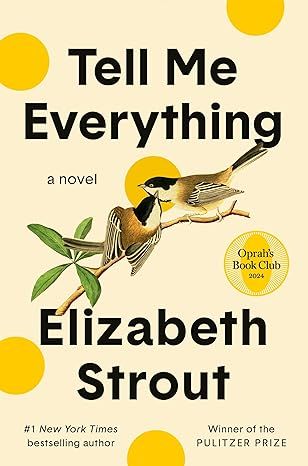Tell Me Everything: Oprah's Book Club: A Novel
4.5
-
2,665 ratings
NEW YORK TIMES BESTSELLER • OPRAH’S BOOK CLUB PICK • From Pulitzer Prize–winning author Elizabeth Strout comes a “stunner” (People) of a novel about new friendships, old loves, and the very human desire to leave a mark on the world.
“Tell Me Everything hits like a bucolic fable. . . . A novel of moods, how they govern our personal lives and public spaces, reflected in Strout’s shimmering technique.”—The Washington Post
With her remarkable insight into the human condition and silences that contain multitudes, Elizabeth Strout returns to the town of Crosby, Maine, and to her beloved cast of characters—Lucy Barton, Olive Kitteridge, Bob Burgess, and more—as they deal with a shocking crime in their midst, fall in love and yet choose to be apart, and grapple with the question, as Lucy Barton puts it, “What does anyone’s life mean?”
It’s autumn in Maine, and the town lawyer Bob Burgess has become enmeshed in an unfolding murder investigation, defending a lonely, isolated man accused of killing his mother. He has also fallen into a deep and abiding friendship with the acclaimed writer Lucy Barton, who lives down the road in a house by the sea with her ex-husband, William. Together, Lucy and Bob go on walks and talk about their lives, their fears and regrets, and what might have been. Lucy, meanwhile, is finally introduced to the iconic Olive Kitteridge, now living in a retirement community on the edge of town. They spend afternoons together in Olive’s apartment, telling each other stories. Stories about people they have known—“unrecorded lives,” Olive calls them—reanimating them, and, in the process, imbuing their lives with meaning.
Brimming with empathy and pathos, Tell Me Everything is Elizabeth Strout operating at the height of her powers, illuminating the ways in which our relationships keep us afloat. As Lucy says, “Love comes in so many different forms, but it is always love.”
Read more
Kindle
$14.99
Available instantly
Audiobook
$0.00
with membership trial
Hardcover
$21.00
Audio CD
$26.44
Ships from
Amazon.com
Payment
Secure transaction
ISBN-10
0593446097
ISBN-13
978-0593446096
Print length
327 pages
Language
English
Publisher
Random House
Publication date
September 09, 2024
Dimensions
5.74 x 1.11 x 8.54 inches
Item weight
2.31 pounds
Product details
ASIN :
B0CRV8HXJX
File size :
1161 KB
Text-to-speech :
Enabled
Screen reader :
Supported
Enhanced typesetting :
Enabled
X-Ray :
Enabled
Word wise :
Enabled
Editorial Reviews
Review
“A generous, compassionate novel about the human need for connection, understanding and love, and the damage that occurs when those things are denied.”—San Francisco Chronicle
“A rich tapestry, intricately wrought yet effortlessly realized, both suspenseful and meditative . . . Suffering and the enduring of it, the human impulse to solve and resolve confronting the fundamental unknowability of others and life’s essential mystery, finding hope, love, and connection in improbable places: Strout’s perpetual preoccupations are here explored with clear sighted rigor, emotional generosity, and bighearted joy.”—The Boston Globe
“[Strout’s] books are really about exploring characters so rich that they reveal more of themselves in book after book after book.”—Minneapolis Star Tribune
“No need to have read Strout’s other work to fall in love with this stand-alone story that explores the quiet impact we have on each other every day.”—Real Simple
“Strout covers the ghosts of marriages and the indignity of old age with her usual thoughtfulness.”—Vulture
“This book may be the epitome of literary fun . . . Once again, Strout has managed to compress key histories from her earlier books into a few telling sentences, a miracle of distillation that opens this novel, and the Strout ecosystem, to new and old readers alike.”—Portland Press-Herald
“Quietly wonderful and wise.”—AAR
“Rejoice, Strout fans . . . the author concerns herself and her characters with the art of narrative . . . a reminder that our mistakes make up our most interesting tales.”—Los Angeles Times
“Life, thank goodness, goes on in Strout’s remarkably-crafted world.”—Town and Country
“Strout weaves a gossamer-light web of a community’s hopes and setbacks.”—The Guardian
“Strout superfans will be thrilled to see the prickly protagonist of the author’s Pulitzer Prize–winning Olive Kitteridge . . .finally cross paths with the tender heroine of My Name Is Lucy Barton and Lucy by the Sea.But if you’ve never cracked the spine of a Strout novel before, don’t sweat it—you’ll feel like a Crosby, Maine, local by the end of the first chapter.”—Oprah Daily
“Another deeply human and vibrant portrait of relationships, Tell Me Everything will bring the cozy and comforting story that fans have come to expect.”—She Reads
“With tenderness, honesty, intimacy, and compassion, Strout uses her cunning powers of observation to draw readers beyond the mundane to the miraculous complexities where true friendship lies. . . . An absolute must-have.”—Booklist, starred review
“The narrative threads make for dishy small-town drama, but even more satisfying are the insights Strout weaves into the dialogue. Longtime fans and newcomers alike will relish this.”—Publishers Weekly, starred review
About the Author
Elizabeth Strout is the #1 New York Times bestselling author of Lucy by the Sea; Oh William!, which was shortlisted for the Booker Prize; Olive, Again; Anything Is Possible, winner of the Story Prize; My Name Is Lucy Barton; The Burgess Boys; Olive Kitteridge, winner of the Pulitzer Prize; Abide with Me; and Amy and Isabelle, winner of the Los Angeles Times Art Seidenbaum Award for First Fiction and the Chicago Tribune Heartland Prize. She has also been a finalist for the PEN/Faulkner Award and the Orange Prize in London. She lives in Maine.
Read more
Sample
1
This is the story of Bob Burgess, a tall, heavyset man who lives in the town of Crosby, Maine, and he is sixty-five years old at the time that we are speaking of him. Bob has a big heart, but he does not know that about himself; like many of us, he does not know himself as well as he assumes to, and he would never believe he had anything worthy in his life to document. But he does; we all do.
Autumn comes early to Maine.
By the second or third week in August a person driving in a car might glance up and see in the distance the top of a tree that has become red. In Crosby, Maine, this year it happened first with the large maple tree by the church, and yet it was not even midway through the month of August. But the tree began to change color on its side facing east. This was curious to those who had lived there for years, they could not remember that being the first tree to change color. By the end of August, the entire tree was not red but a slightly orange yellowy thing, to be seen as you turned the corner onto Main Street. And then September followed, the summer people went back to where they had come from, and the streets of Crosby often had only a few people walking down them. The leaves did not seem vibrant, overall, and people speculated that this was because of the lack of rainfall that August—and September—had endured.
A few years earlier, people entering the town of Crosby from the turnpike’s exit would drive past a car dealership and a donut shop and a diner, and also by large run-down wooden houses whose porches held things like bicycle tires and plastic toys and coat hangers and air conditioning units that had not been used in years, and in one of these houses a middle-aged man named Ricky Davis lived. He was a large man and frequently drunk and could often be seen leaning over the rail of his side porch with his pants halfway down showing his huge bottom, crack and all, to the folks driving by, and those who had not seen this before would turn their heads to watch with a sense of wonderment. But then the town council had voted to put in the new police station at that spot, and so Ricky Davis and the house he had lived in were now gone; it was rumored that he was living out near the old fairgrounds in a Hatfield Housing unit.
When you got into the middle of the town you could see a large brick house that stood a little off Main Street. After the clocks were set back in November, making it dark earlier, the few folks driving by, and those who might be strolling on the sidewalk across the street, could see into the windows of this house, yellow from the lamps turned on inside, and Bob Burgess and his wife, Margaret Estaver, might be observed cooking together in their kitchen until they tugged their curtains closed. People knew who they were, and in a way not fully conscious there was a sense of safety that came from this couple living right here in the middle of town: Margaret was the Unitarian minister, and she had her following. Bob had been a lawyer in New York City for many years in his younger days, but nobody held this against him, probably because he had grown up in Shirley Falls, forty-five minutes away; he had returned to Maine almost fifteen years ago when he married Margaret. He still took occasional criminal cases in Shirley Falls and was known to keep an office there, though he had mostly retired by now. And also—people spoke of this quietly—Bob had suffered a tragedy in childhood: He had been playing with the gearshift of the family car and it had rolled down the hill of the Burgesses’ driveway; people in town understood that the car—and therefore Bob—had killed Bob’s father, who was checking on their mailbox there.
Olive Kitteridge, who was ninety years old and living in the retirement community called the Maple Tree Apartments, knew this about Bob Burgess and she had always liked him, she thought he had a quiet sadness to him, most likely from this early misfortune. Olive did not particularly care for Bob’s wife, Margaret. This was because Margaret was a minister and Olive did not like ministers—except for Cookie, who had married her to her first husband, Henry. Wonderful man, Reverend Daniel Cooke. And wonderful man, Henry Kitteridge.
The pandemic had been hard for Olive Kitteridge—hard for everyone, really—but Olive had endured it, day after day in her little apartment in this retirement community, yet when they stopped allowing people to eat in the dining room and started bringing their food to them instead, she thought she would go absolutely batty. By the end of that first year, though, with her vaccinations and then later a booster, she was able to get out a bit more, someone might drive her into town or take her down by the water. But the real problem was that during the pandemic, Olive’s best friend, Isabelle Goodrow, who lived two doors down from her, had taken a bad fall and—of all the awful things that could have happened—had been moved “over the bridge” to the nursing home part of the place. Now Olive went to visit Isabelle every day, reading her the newspaper from front to back. But it had been hard, and it still was.
Out on the end of the point of Crosby, high up on a cliff that looked over the (mostly) roiling waters of the Atlantic Ocean, lived a woman named Lucy Barton, who had arrived with her ex-husband, William, two years before, escaping New York City during the pandemic, and they had ended up staying in town. There were mixed feelings about this: The natural reticence toward New Yorkers was part of it, but also housing prices in Crosby had gone through the roof exactly because of folks like this Lucy Barton, who had decided to stay in town, and anyone from Maine who had been hoping to move into a nicer house now found that they could not afford one. Lucy Barton had grown up in a small town in Illinois and had lived in New York City her whole adult life; she had never even been a summer person in Maine before arriving here with her ex-husband. Also, Lucy Barton was a fiction writer, and that made people have different feelings; mostly they would have preferred her to go back to New York, but nobody seemed to have anything bad to say about her; and except for her walks along the river with her friend Bob Burgess she was rarely seen. Although she was sometimes observed going through the back door that led up to the little office space she rented above the bookstore.
On Main Street there were HELP WANTED signs or HIRING NOW signs in most of the store windows, and along the coastline a few restaurants had to close because there were not enough people to work in them. What had gone wrong? There were different theories, but it would be fair to say that most inhabitants of Crosby did not know. They only knew that the world was not what it had once been. And most of these people in the town of Crosby were old, or almost old, because this is the way the population of Maine had been for years. Some said that this was the problem, that there were no young folks to take these jobs. Others argued that the unemployment situation was happening not just in Maine but all across the country; some speculated that it was the opioid crisis, that people weren’t able to pass their drug test in order to work. And then others claimed that the younger generation was at fault; Malcolm Moody’s sixteen-year-old grandson, for example, had come to visit for three days and was playing videogames on his iPhone constantly. What could you do?
Nothing.
And then in October the foliage exploded, shattering the world with a goldenness. The sun shone down, and yellow leaves fluttered everywhere; it was a thing of beauty. The days were cold and at night it rained, but in the morning there was the sun again, and all the glory of the natural world twinkled and nestled itself around the town of Crosby. The clouds that were low in the sky would suddenly block out the sun, and then just as quickly the clouds would part and it was as though a bright light had been turned on and the sky was blue and bright again with the yellow and orange leaves floating quietly to the ground.
A thought had taken hold of Olive Kitteridge on one of these days in October, and she pondered it for almost a week before she called Bob Burgess. “I have a story to tell that writer Lucy Barton. I wish you would have her come visit me.”
The story was one that Olive had been reflecting on with more and more frequency, and she thought—as people often do—that if her story could be told to a writer, maybe it could be used in a book one day. Olive did not know if Lucy was a famous writer or not quite a famous writer, but she decided it did not matter. The library always had a long wait list for Lucy’s books, so Olive had ordered them from the bookstore instead, and she read through them, and something made her think that this Lucy might like—or could possibly use—the story Olive had to tell.
So on this particular autumn day, the yellow leaves of the tree seen through Olive’s large windowed back doorway were quivering to the ground as she waited for Lucy Barton to show up. Olive, sitting in her wingback chair, saw two chickadees and a titmouse at her feeder. She leaned forward and spotted a squirrel. Olive rapped her knuckles against the window, hard, and the squirrel scurried away. “Hah,” said Olive, sitting back. She hated squirrels. They ate her flowers, and they were always bothering her birds.
Olive found her glasses on the small table next to her and picked up her big cordless phone, which was also on the table, and pressed some numbers on it.
Read more
About the authors
Elizabeth Strout
Elizabeth Strout is the author of the New York Times bestseller Olive Kitteridge, for which she was awarded the Pulitzer Prize; the national bestseller Abide with Me; and Amy and Isabelle, winner of the Los Angeles Times Art Seidenbaum Award and the Chicago Tribune Heartland Prize. She has also been a finalist for the PEN/Faulkner Award and the Orange Prize in London. She lives in Maine and New York City.
Read more
Reviews
Customer reviews
4.5 out of 5
2,665 global ratings
Tinabeth
5
The characters, in her books are so like: us, you, them,
Reviewed in the United States on September 12, 2024
Verified Purchase
What to say?
About this read
“Tell Me Everything “, author Elizabeth Strout,copyright 2024. Her latest, A Novel.
I read It fast, to fast, as I always do. They are all so good reads.
I have read everything Mrs. Strout has published all of them. All. And as this book title says, she tells you everything. She does.
The characters, in her books are so like: us, you, them, the person in the checkout line, at the market, the person you thought you knew, a friend at a party you didn’t know and probably will never know.
Highly recommend this read. And all of them.
But if you have not read Elizabeth Strout’s writings , read: All, all of them.
“My Name is Lucy Barton”, yes read that one soon, could be a start, even though they’re not sequel books.
Some of the same characters do pop up in lots of her books:
My Name is Lucy Barton The Burgess Boys Lucy by the Sea Oh William! Olive Kitteridge
And my favorite character is Olive!
Elizabeth Strout writes deep, you know what I am saying, how you talk to yourself deep. …and don’t think about it….and don’t talk about it.
Well, she just writes like that, our thoughts, you know.
“Ay-yuh” she does, and it’s funny , and serious and it’s ok to think these things, cause we all do . Life is complicated and What is it all about? And then we just laugh.
I do think we all have unrecorded lives. Unrecorded stories deep inside that should be told.
Get now and go get a copy of Elizabeth Strout’s latest novel “Tell Me Everything”
and don’t think about it.
Tinabeth Chapman
Read more
4 people found this helpful
prisrob
5
Love Is Love
Reviewed in the United States on September 19, 2024
Verified Purchase
We meet many of the author’s, Elizabeth Strout, family in this book. I call them family even though they are not related to Elizabeth. But, they are figments of Strout’s imagination. They all have great qualities, and the ones we read the most, Olive, Lucy and Bob reveal their true selves.
What is the point of life? The characters ask, What is the point of life, of this story? Read along and you will make your own decisions. Men, women, hate, sex, love, and every emotion is here. There are many stories, and they do, indeed, have much to tell us. As usual Strout gives us a remarkable book. I am in my 80’s and have read thousands of books, I am a constant reader. Elizabeth Strout is my favorite author. She grabs me and pulls me in. I am in mourning when I have finished her latest book. Each book is stand alone, but you would be wise to start with her first book and work your way through to garner the most info about the characters. I envy you. . You will not meet another author like Elizabeth Strout.
Recommended Highly.
prisrob 09-19-2924
Read more
6 people found this helpful
Julianne Fiocca
5
delicious writing. grounding energy.
Reviewed in the United States on September 24, 2024
Verified Purchase
Strout continues to deliver rich but ordinary stories with well- developed characters. The trueness and relatability was grounding and calming.
2 people found this helpful
Greta Dewey
5
Breathtaking
Reviewed in the United States on September 16, 2024
Verified Purchase
My heart is full and bursting with gratitude after finishing this book. I have read all of Elizabeth Strout’s books but this tops them all for me. I’m blown away by her ability to intertwine her characters and that we get to watch them grow. Her characters are all so beautifully human. This is one of the best books I’ve ever read. I recommend it with my whole heart.
Read more
8 people found this helpful
Parnassus on Wheels
5
one for the ages
Reviewed in the United States on September 15, 2024
Verified Purchase
I was honored to hear Elizabeth Strout deliver a keynote address in Florida a couple of years ago and to have a few minutes to speak with her afterwards. I told her of my conviction that she deserves the Nobel Prize for her body of work, especially for THE BURGESS BOYS, which tells so much of our national struggle with immigration, and LUCY BY THE SEA, her novel about the first year of the COVID pandemic. She seemed startled at the idea, but also grateful, in that self-effacing way of hers. If I could speak to her again, I would tell her that TELL ME EVERYTHING makes me even more certain that she should be honored with that international award. So much about this latest book is the universal story of what it means to be human and to survive and sometimes not survive. It tells about my own family in such a profound way that it kept me up most of the night. I have not felt so grateful to a novelist since I first discovered the work of Willa Cather, some decades ago. It was an injustice that Cather never received the Nobel. I hope Strout will get her due and stand in the footsteps of Toni Morrison, Sigrid Undset, William Faulkner, John Steinbeck, Pearl S. Buck, Doris Lessing, T.S. Eliot, W.B. Yeats, Samuel Beckett, Saul Bellow, and other great laureates of literature.
Read more
2 people found this helpful
Top Elizabeth Strout titles
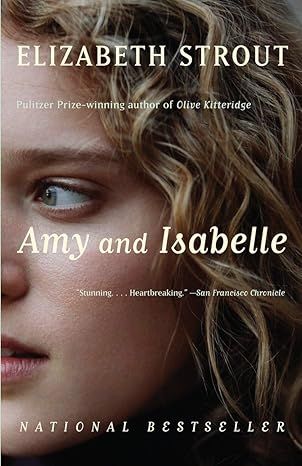
Amy and Isabelle: A novel
4.3
-
9,403
$3.34
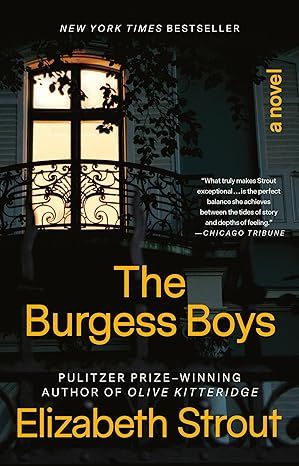
The Burgess Boys: A Novel
4.1
-
11,063
$2.11

Oh William!: A Novel
4.2
-
22,498
$5.04
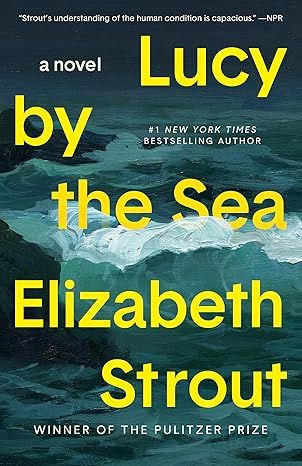
Lucy by the Sea: A Novel
4.3
-
18,461
$4.00
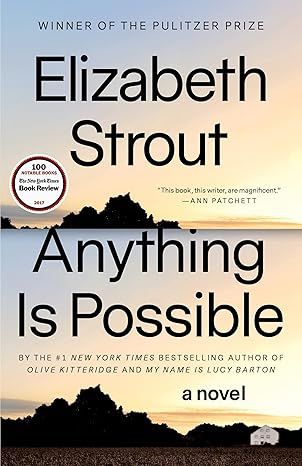
Anything Is Possible: A Novel
4
-
19,323
$5.35
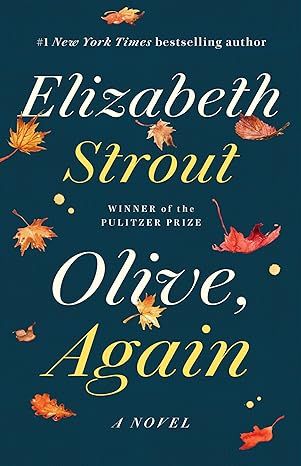
Olive, Again: A Novel (Olive, 2)
4.4
-
24,861
$9.76
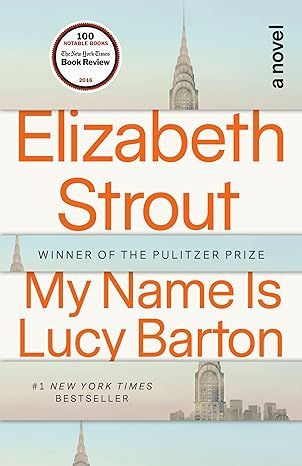
My Name Is Lucy Barton: A Novel
3.8
-
36,168
$7.94
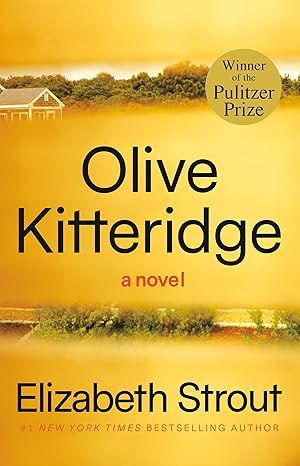
Olive Kitteridge
4.2
-
30,647
$9.49
Best Sellers

The Tuscan Child
4.2
-
100,022
$8.39

The Thursday Murder Club: A Novel (A Thursday Murder Club Mystery)
4.3
-
155,575
$6.33

Sapiens: A Brief History of Humankind
4.6
-
140,302
$13.49

The Butterfly Garden (The Collector, 1)
4.3
-
88,556
$9.59

Things We Hide from the Light (Knockemout Series, 2)
4.4
-
94,890
$11.66

The Last Thing He Told Me: A Novel
4.3
-
154,085
$2.99

The Perfect Marriage: A Completely Gripping Psychological Suspense
4.3
-
143,196
$9.47

The Coworker
4.1
-
80,003
$13.48

First Lie Wins: A Novel (Random House Large Print)
4.3
-
54,062
$14.99

Mile High (Windy City Series Book 1)
4.4
-
59,745
$16.19

Layla
4.2
-
107,613
$8.99

The Locked Door
4.4
-
94,673
$8.53
